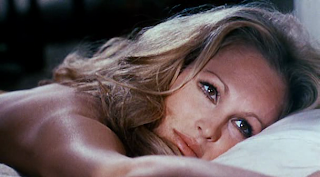This surprisingly snappy film was a vague memory from childhood viewing of a, no doubt heavily censored, version on TV… there’s very little violence but an awful lot of Ursula “Undress” as the wits of the day put it.
Smartly directed by Peter Hall (yes, that one: father of Rebecca and now a Sir…) it’s an ostensible straightforward turn of the decade heist movie which features a still unpredictable plot and three very strong leads. Its narrative structure is also unusual with deft turns in time which explain and elaborate on what could have been a less straight-ahead story.
 |
| The Office...Stanley Baker with TP McKenna next door |
Stanley Baker (who also produced) plays Mr Graham a seemingly straight-laced Assistant Bank Manager with a great future behind him and a predictable course set ahead.
The film opens with a brief encounter with him telling an shadowy individual that he’s going to get some money… the titles roll in a computer-typeface over the modern London where Graham’s bank is located (Regents Park?). He walks into his glass office next to an identical unit housing Mr Smith (the great TP McKenna) and another, larger, room in which their boss Mr Williams (David Waller) practices his golf stroke.
Mr Graham has a meeting with Lady Britt Dorset (Ursula Andress) who is in need of a loan, too enable her to see her ill father back in Switzerland… She is granted £500 and two months in which to pay it back… now that’s what I call British banking!
 |
| Ursula Andress and Stanley Baker |
A suit turns out, Britt’s dishonesty is exactly what Graham has been looking for – it’s unclear whether he arranged their first meeting… especially as their further connections are revealed.
Their date goes well and the Lady and the Bank Manager find themselves in bed – they obviously have more in common than at first appeared.
 |
| A boat briefing as they pass the old Southbank... |
But it seems that Graham and Lord Nicholas Dorset (David Warner) have already met – and it was "Nick" who suggested his wife as the potential third member of their putative gang… just one of many twists and turns that keeps things away from predictable.
Graham issues Britt and Nick with explicit instructions which verge on the over-cautious. He insists on their telling only the truth and feeds them both lines that he knows will come back to him unadulterated by their own agendas.
Nick is sent on various errands – to Amsterdam to buy a wig and elsewhere – untraceable steps in a larger caper. And, all the while Graham and Britt continue their bed-based intimacy… not that Britt and Nick have fallen out of their own habit.
 |
| Another side of Ursula... |
All clear?
Now Graham has worked out a way to use this to his advantage and it would be churlish to reveal how this will be done, especially as the film takes so long to reveal the plot.
Needless to say, both Nick and Britt are heavily involved and everything is timed to perfection… well, almost everything…
The heist gets postponed in the nick of time and tension builds… can any of these people really trust each other: it’s not a question of will they get away with it but who will get away with it?
David Warner is his usual unsettling self - reminding me a lot of Rhys Ifans, a world-weary lothario who is just about likeable.
 |
| The face... |
Baker is also superb acting against type as the timid but determined Graham. Even the comb-over hair and appalling moustache can’t dent his masculine edge but he obviously relished the chance to play the blue-colour criminal.
 |
| Warner and Baker |
Dusty verdict: An enjoyable crime caper with a little more under the bonnet than others of the same vintage may lead you to expect.
Now available on Blu-ray and DVD from those nice people at Network… it’s worth buying and re-watching every ten years as you’re bound to forget the plot details.
.png) |
| The Sunbeam Alpine |
+breakfast.png) |
| Tea and toast |





+8.png)
.png)
.png)
+clown.png)
+beach.png)
+rose.png)
+wedding.png)
+wedding.png)
+train.png)
+day+2.png)
+dark.png)
+spin.png)
+spin.png)
+cross.png)
+grave+rose.png)
+beach+2.png)
+title.png)
+seaside.png)
.png)
+mist.png)